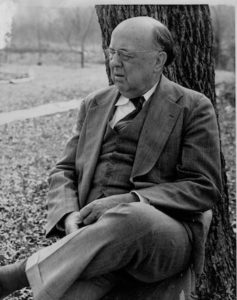
John A. Lomax
*John Lomax was born on this date in 1867. He was a white-American teacher, musicologist, and folklorist who did much to preserve American folk music.
The Lomax family originally came from England with William Lomax, who settled in Rockingham County in "the colony of North Carolina." John Avery Lomax was born in Goodman in Holmes County in central Mississippi to James Avery Lomax and Susan Frances Cooper. In December 1869, the Lomax family traveled by ox cart from Mississippi to Texas.
John Lomax grew up in central Texas, just north of Meridian. His father raised horses and cattle and grew cotton and corn on the 183 acres of bottomland he had purchased near the Bosque River. He was exposed to cowboy songs as a child. At around nine, he befriended Nat Blythe, a former black sharecropper hired as a farmhand by James Lomax. The friendship, he wrote later, "perhaps gave my life its bent." Lomax, whose own schooling was sporadic because of the heavy farm work, taught Blythe to read and write, and Blythe taught Lomax songs, including "Big Yam Potatoes on a Sandy Land" and dance steps such as "Juba." When Blythe was 21 years old, he took his savings and left. Lomax never saw him again and heard rumors that he was murdered. For years afterward, he always looked for Nat Blythe when traveling around the South.
When he was about to turn twenty-one, and his legal obligation to work as an apprentice on his father's farm was ending, his father permitted him to take the profits from the crops of one of their fields. Lomax used this and the money from selling his favorite pony to pay to further his education. In the fall of 1887, he attended Granbury College, and in May 1888, he graduated and eventually became a teacher. He began his first job as a teacher at a country school in Clifton, southeast of Meridian. As time went on, he grew tired of the low pay and country school grind, and he applied for work at Weatherford College in Weatherford in Parker County in the spring of 1889. He was a principal by the school's new president, David Switzer, who had previously been president of Granbury College until it was closed, and he transferred to Weatherford.
In 1890, after a summer course at Eastman Business College in Poughkeepsie, New York, Lomax returned to Texas, where he became head of the Business Department of Weatherford College. Each summer between 1891 and 1894, he attended the annual lecture-and-concert series at New York State's Chautauqua Institute. In February 1903, Lomax accepted an offer to teach English at Texas A&M University beginning in September. In the meantime, he enrolled at the University of Chicago for a summer course to bolster his credentials.
Upon his return to Texas, he became engaged to Bess Brown, and they married on June 9, 1904. The couple settled down at College Station near the A&M campus. Their first child, Shirley, was born on August 7, 1905. In June 1908, Lomax became a full professor at A&M. In June 1910, Lomax accepted an administrative job at the University of Texas as "Secretary of the University Faculties and Assistant Director of the Department of Extension."
In November 1910, the anthology Cowboy Songs and Other Frontier Ballads was published by Sturgis and Walton. Around the same time, Lomax and Professor Leonidas Payne of the University of Texas at Austin co-founded the Texas Folklore Society, following Kittredge's suggestion that Lomax established a Texas branch of the American Folklore Society. Lomax and Payne hoped the society would further their research while kindling an interest in folklore among like-minded Texans.
On Thanksgiving Day, 1909, Lomax nominated Payne as society's president, and Payne nominated Lomax as the first secretary. His second son, Alan, was born in January 1915. In time, he would prove a worthy successor to his father. A second daughter, Bess, was born in 1921, and she, too, had a distinguished career as a performer and teacher. In 1931, Lomax's wife, Bess Brown, died at 50, leaving four children (the youngest, Bess, was ten years old). In addition, the Dallas bank where Lomax worked failed: he had to phone his customers individually to announce that their investments were all worthless.
In debt and unemployed and with two school-age children to support, the sixty-five-year-old went into a deep depression. To revive his father's spirits, his oldest son, John Lomax Jr., encouraged him to begin a new series of lecture tours. They took to the road, camping out by the side of the road to save money, with John Jr. (and later Alan Lomax) serving the senior Lomax as a driver and personal assistant. In June 1932, they arrived at the offices of the Macmillan publishing company in New York City.
Here Lomax proposed his idea for an anthology of American ballads and folksongs, with a distinctive emphasis on the contributions of Black Music. It was accepted, and he traveled to Washington to review the holdings in the Archive of American Folk Song of the Library of Congress, after the departure of Robert Gordon from the library in 1934. Thus began a ten-year relationship with the Library of Congress involving John and the entire Lomax family, including his second wife, Ruby Terrill Lomax, Professor of Classics and Dean of Women at the University of Texas, whom he married in 1934.
John A. Lomax was named Honorary Consultant and Curator of the Archive of American Folk Song, which he held until his death. His sons and daughters assisted with his folksong research and with the daily operations of the Archive: Shirley, who performed songs taught to her by her mother; John Jr., who encouraged his father's association with the Library; Alan Lomax, who accompanied John on field trips and who from 1937 to 1942 served as the Archive's first paid (though very nominally) employee as Assistant in Charge; and Bess, who spent her weekends and school vacations copying song texts and doing comparative song research.
John A. Lomax's contribution to the documentation of American folk traditions extended beyond the Library of Congress Music Division through his involvement with two agencies of the Works Progress Administration (WPA). In 1936, he served as an advisor on folklore collecting for the Historical Records Survey and the Federal Writers' Project. Lomax's biographer, Nolan Porterfield, notes that the outlines of the famed WPA State Guides from this work resemble Lomax and Benedict's earlier Book of Texas. As the Federal Writers' Project's first Folklore Editor, Lomax also directed the gathering of ex-slave narratives and devised a questionnaire for project fieldworkers to use.
The WPA project to interview former slaves assumed a form and a scope that bore Lomax's imprint and reflected his experience and zeal as a folklore collector. His sense of urgency inspired the efforts in several states. And his prestige and personal influence enlisted the support of many project officials, particularly in the deep South, who might otherwise have been unresponsive to requests for black materials. One might question the wisdom of selecting Lomax, a white Southerner, to direct a project involving data collection from former black slaves. Yet, whatever racial preconceptions Lomax may have held do not appear to have any appreciable effect on the Slave Narrative Collection.
Lomax's instructions to interviewers emphasized obtaining a faithful account of the ex-slave's version of their experience. "It should be remembered that the Federal Writers' Project is not interested in taking sides on any question. The worker should not censor any materials collected regardless of its nature." Lomax constantly reiterated his insistence that the interviews be recorded verbatim, with no holds barred. In his editorial capacity, he closely adhered to this truism. Upon Lomax's departure in 1938, Benjamin A. Botkin succeeded him as the project's folklore editor.
This resulted in the invaluable compendium of authentic slave narratives: Lay My Burden Down: A Folk History of Slavery, edited by B. A. Botkin (Chicago: University of Chicago Press, 1945). Lomax served as the Texas Folklore Society president for 1940–41 and 1941–42. In 1947 his autobiography Adventures of a Ballad Hunter (New York: Macmillan) was published and was awarded the Carr P. Collins Prize as the best book of the year by the Texas Institute of Letters. The book was optioned to Hollywood for a movie starring Bing Crosby as Lomax and Josh White as Lead Belly, but the project was never realized.
John A. Lomax died of a stroke at eighty on January 26, 1948. On June 15 of that year, Lead Belly gave a concert at the University of Texas, performing children's songs such as "Skip to My Lou" and spirituals (performed with his wife Martha) that he had first sung years before for the late collector. In 2010, John A. Lomax was inducted into the Western Music Hall of Fame for his contributions to cowboy music.
